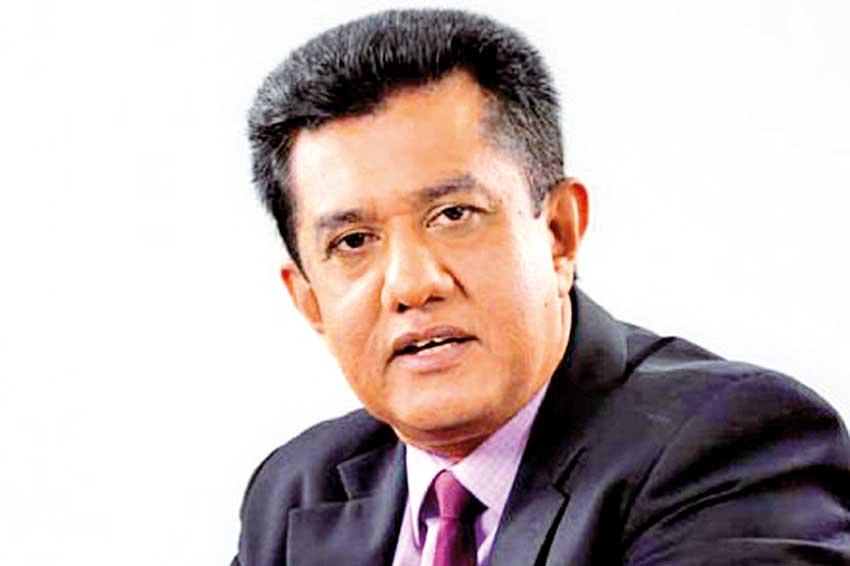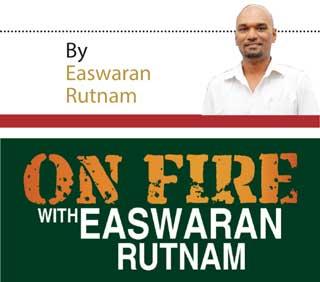03 Nov 2022 - {{hitsCtrl.values.hits}}

Some decisions taken were “mad”
The economic crisis was man-made
Individuals were irked by COPE inquiries
Proposals to give COPE more powers were shot down
The crucial probe was to begin when Parliament was prorogued
Future stand in politics undecided
 The appointment of the new Committee on Public Enterprises (COPE) was shrouded in controversy after former Chairman, Prof. Charitha Herath was overlooked by the ruling party when nominating the new members.
The appointment of the new Committee on Public Enterprises (COPE) was shrouded in controversy after former Chairman, Prof. Charitha Herath was overlooked by the ruling party when nominating the new members.
Eventually, it was up to Opposition Leader Sajith Premadasa to nominate Prof. Charitha Herath to fill a seat made vacant in the new COPE committee with the resignation of Samagi Jana Balawegaya MP Dr Harsha de Silva.
However, Premadasa’s decision to nominate Prof. Charitha Herath has raised some eyebrows.
In an interview with Daily Mirror, Prof. Charitha Herath speaks about the decision by the ruling Sri Lanka Podujana Peramuna (SLPP) not to nominate him to COPE, about former President Gotabaya Rajapaksa and about failed attempts to give more powers to COPE.
Full Interview can be watched on Daily Mirror Online.
Extracts of the interview:
Q You were in the spotlight when the new COPE committee was appointed. The SLPP had decided not to nominate you. Why do you think that decision was taken?
Well, that was the question that I had been also asking myself. So many people had been asking me the same question. I still cannot understand why they have not included me.
Q But this is your political party that has ignored you
Yes. I was and still am part of that party (SLPP) and the process. Some people may have thought that I am not suitable for the way they think. Maybe they wanted somebody who they think could manage according to their own wish. But I don’t know the real reason. I have asked the President and the Prime Minister about this through Twitter but they have not responded.
Anyway, the outcome was that they dropped me from the list of members who they had proposed, Fortunately, the Opposition Leader proposed my name for a slot which was made available after Dr. Harsha de Silva resigned. He resigned because he had other commitments to another committee.
Q But Premadasa’s decision to nominate you has given rise to speculation that there might be a hidden agreement between you and the Opposition Leader.
Anybody can think of anything. But you know we have crossed over to the opposition. Not to the SJB but to the Opposition benches in Parliament. Mr. Premadasa was the Opposition Leader. My name was not included in the list so he and many others felt that my engagement with this committee was acceptable. So, the opposition Leader thought that my name should be included. There is no hidden agreement.
Q When you were the Chairman of COPE you highlighted incidents of misappropriation of funds by some State institutions including SriLankan Airlines, CEB and CPC. When that process was going forward were you under any sort of pressure from the top?
Well, I need to be very honest here. I was not under any pressure from anybody. But some people were not happy with the inquiries that I had carried out.
Q Were these people from the political leadership or outside?
I don’t want to mention names. But you know some people are not happy with what I have done. But I continued and that is why at one time I was dropped from COPE and about to be completely dropped but was included again.
Q Some people were of the view that COPE is weak. That it did not have enough powers to be effective.
That is true. COPE does not have sufficient powers to fully execute the recommendations it makes. We have been trying our best to enhance the Standing Orders related to the Committee. Standing Order 120 is related to the Committee on Public Enterprise and we proposed to the subcommittee on Standing Orders to consider some of our proposals and to change the existing Standing Orders but that did not happen the way that we had expected. We had requested them to look at whether we will be given powers to send the outcome or the final report to the Attorney General directly. That was one proposal we made. But it was not considered. We also proposed sending the files to the AG Department, we also sought approval to get a member from the AG’s Department to sit on the committee. That was also not accepted. Another proposal we made was to send the files or special request to Parliament and get parliament’s mandate to send the files to the Attorney General but that was also not accepted.
There were some minor changes made to the Standing Orders but as you said we need to enhance parliamentary oversight committees further and in order to do that you need to change the related Standing Orders.
Q Do you think the public is losing faith in these committees especially when they are changed every time Parliament is prorogued?
We need to get the trust back into the system. If people don’t trust the democratic system then they will leave the system. If they leave the system then there will be anarchy. That is what happened the last time. There is a huge responsibility on our hands to make sure that the people trust the process of parliamentary democracy. The oversight committees are one very important section of our parliamentary culture, our parliamentary democratic process. So I think we need to win the hearts of the people and get their trust back into this system.
Q What key decision was COPE about to take the last time Parliament was prorogued?
Actually, there was a very important inquiry that we had lined up. That was on financial decision-making. It was related to financial matters between 2018 to 2022. That was based on a report which was submitted by the Auditor Generals to Parliament. It was a big report and our committee had gone through that report and we had planned to stand committee-type examinations on this matter. We had fixed five days to make inquiries. It was scheduled for the 19th 20th 21st 22nd and 23rd of July. We had summoned people to be questioned including the former Central Bank Governors including Professor W.D. Lakshman, Cabraal, Indrajit Coomaraswamy and former President’s Secretary Dr. P. B. Jayasundara. The inquiries were about to commence when the President resigned and Parliament was prorogued by the new President. But I have requested the new committee to continue with these inquiries. I will push to get it through. The Geneva human rights council spoke about financial crimes in Sri Lanka. So these inquiries will ensure accountability.
We need to look at the issues, the decisions that were made and why those decisions were taken.
In my view, the economic crisis was not natural. It was man-made. It was created as a result of some of the decisions taken. You have to deal with the officers. They can come out and say who took some decisions.
Q Do you have any regrets about supporting Gotabaya Rajapaksa for the presidency?
I don’t know if the word regret is correct. But I feel sad about the way he handled some issues. We went to the people and convinced them that this was the correct leader. We were given the power. But we were unable to fulfil the pledges given to the people. The people did their duty but we were unable to deliver.
Q Was there an outside hand controlling the President at the time?
I don’t know what the reason was. But his decision-making was so poor.
Q Was he actually calling the shots or was it Basil Rajapaksa?
Basil Rajapaksa was part of the Government.
Q But he was not the President
Yes, he was not the President but he was part of the executive power because he was the Finance Minister. That is one of the most powerful positions in the Government. I am not going to blame others. The President should be responsible. The people voted for Gotabaya Rajapaksa. So, he must be careful. He has a responsibility to deliver according to the manifesto given by the people. But he took some mad decisions. Those were not rectified. He messed it up.
08 Jan 2025 2 hours ago
08 Jan 2025 2 hours ago
08 Jan 2025 2 hours ago
08 Jan 2025 3 hours ago
08 Jan 2025 3 hours ago